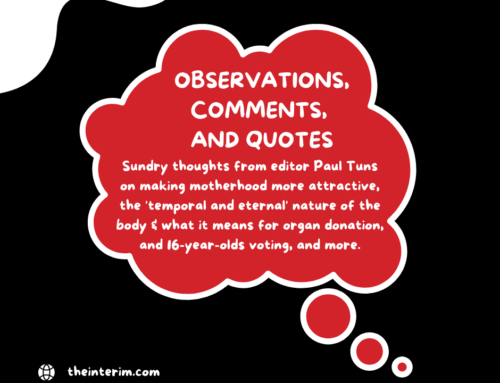Video In Review
Euthanasia: False Light
Produced by the International Anti-Euthanasia Task Force
Available from Life Cycle Books, 416-690-5860
1995, 15 minutes, $29.95
Denny Brace found a new oncologist when his first one coldly predicted he’d be dead in 12 months. Denny went through chemotherapy and now, three years later, with his pain under control, he jogs, lifts weights and works part-time in construction.
Jim Curly was told he had three months to live, but he outlived his doctor. Today Jim spends his time with his grandchildren, two of whom were born after he was expected to be dead.
Kelly Markham was told by her doctors that she had only six months to live. They were wrong. Now, ten years later, Kelly is happily married.
If assisted suicide or euthanasia had been legal when these three were told they had only months to live, Denny, Jim and Kelly might have chosen death – seduced by the false light of euthanasia.
False Light looks at euthanasia and assisted suicide through the eyes of five people: three patients diagnosed as terminally ill as well as a doctor and a hospice nurse.
Dr. Robin Bernhoft notes that euthanasia, like abortion, seems to attract the “bottom feeders, the marginal doctors whom nobody respects. Kevorkian is an unemployed pathologist. He knows nothing about patient care.”
Bernhoft admits that as a doctor, “It’s a lot easier to push people out of the picture than to actually get involved with them.”
Denny is delighted when his second doctor tells him, “We’re in this together. I promise you I will not give up on you.” Better a health care provider who will “stick with you to the end, rather than one who brings on your end.”
False Light reports that a 26-year old Dutch ballerina who had developed arthritis in her toes didn’t want to live. The doctor who euthanized her was said to remark that, “One doesn’t enjoy doing this, but it’s her choice.”
Euthanasia is not the answer to short-term depression.
Although American, False Light focuses on the people and principles involved, without using any national statistics or politics, so it transfers well into the Canadian scene.
Ending the Journey is a recent Canadian video that at 40 minutes and only $24.95 packs in more information and deals with more complexities of euthanasia and assisted suicide that False Light does.
Ending the Journey works at a more advanced level, False Light at a more introductory one. Neither film uses religious arguments per se, so both are suitable for secular presentations.
False Light, has won two prestigious American Telly Awards. The awards showcase outstanding television and video productions.
The educational video has categorized as a non-broadcast film and won in the “social issues” category.
“Winning the coveted award in the social issues category is especially significant,” said producer Chuck Cavalier. “It shows that the video really moves people, even film judges, to see the very real personal and social dangers inherent in the practice of assisted suicide and euthanasia.




